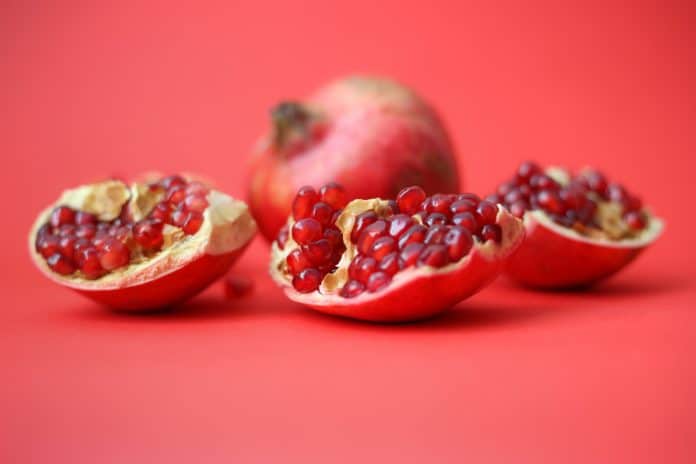Pomegranate has a recorded history of medicinal properties, which can be attributed to the presence of a large number of phytochemicals present in it. With a lot of information available, Dr. Sreeja S and her colleagues at the Rajiv Gandhi Centre for Biotechnology (RGCB), Thiruvananthapuram, established the tremendous potential of pomegranate outer hard husk (pericarp) to prevent breast cancer, which is the second leading cause of cancer-related deaths in women.
Dr. Sreeja’s team demonstrated the role of pomegranate pericarp methanolic extract in reducing proliferation in breast cancer cells by binding to the estrogen receptor (ER) safely. Pomegranate pericarp extract displays a Selective Estrogen Receptor Modulators (SERM) profile. The SERM are ER ligands used in the hormonal therapy for ER-breast cancers.
Like estrogen, the methanolic extract also reduces low-density lipid (LDL) levels increased after surgical removal of ovaries. Dr. Sreeja discovered that it could prevent the cell proliferation induced by 27 Hydroxycholesterol (27HC), an endogenous SERM that can act through ER-mediated mechanisms. Cholesterol metabolite 27HC has been found to act via ER and result in breast cancer cell proliferation leading to cancers. Most of the findings, therefore, indicate that pomegranate extracts can act as potent Phytoestrogens and act via various means to reduce estrogen carcinogenesis.
Different types of breast cancers occur depending on the source, aggressiveness, and expression of different kinds of protein receptors present on breast cancer cells. Depending on the presence or absence of estrogen receptor (ER), breast cancer is called ER-positive or negative, respectively. For ER-positive breast cancer, one of the significant treatment regimes involves the use of tamoxifen, a selective ER modulator, or SERM. The tamoxifen acts like estrogen or opposes its action depending on the tissue it acts upon. It has opposite effects of estrogen and may protect against breast cancer. Furthermore, tamoxifen also retains its positive impact like that of estrogen in the cardiovascular system and may cause endometrium cancer. Hence, ideal SERM must retain the positive effects of estrogen and have minimal side effects.
Pomegranate is rich in polyphenols and has an abundant amount of ellagitannins, which are broken down into ellagic acid within the body. The ellagic acid is further metabolized to urolithins by gut microflora. The past decade has witnessed extensive research on these polyphenolic metabolites with huge health benefits such as cardiovascular health, neurodegenerative diseases, muscle strengthening, increasing lifespan and preventing cancers. Dr. Sreeja’s team is now on the journey of finding how this compound can act as an ideal SERM.
Journal Reference:
- Pomegranate extract demonstrate a selective estrogen receptor modulator profile in human tumor cell lines and in vivo models of estrogen deprivation. DOI: 10.1016/j.jnutbio.2011.03.015
- Evidence of pomegranate methanolic extract in antagonizing the endogenous SERM, 27-hydroxycholesterol. DOI: 10.1002/iub.1465
